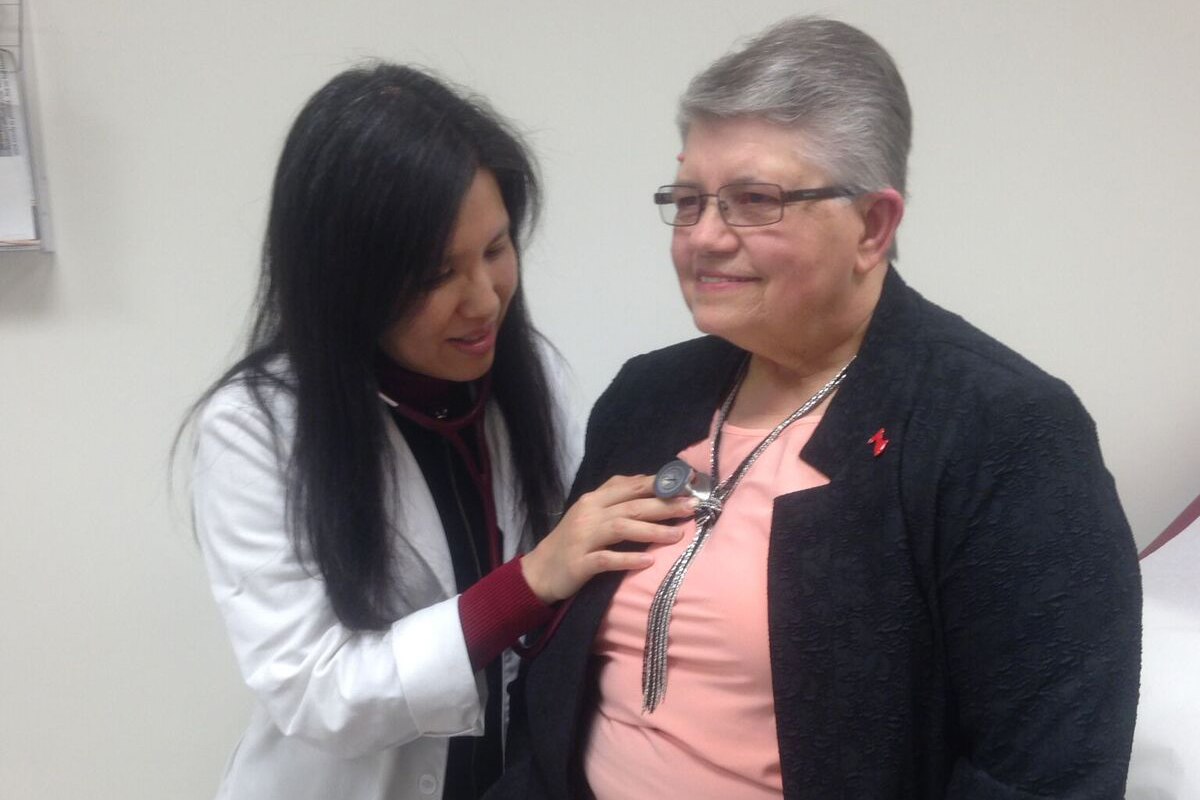
Sixty-eight year-old Cris Muscara says her heart attack “blew her away.”
“If I had not paid attention to all the public service announcements about the possible different warning signs of a female heart attack, I would never have thought I was actually having one,” says Muscara of Terryville, Conn.
On June 24, 2015, Muscara was sleeping when she suddenly woke up. It was 4:30 a.m. She got out of bed, and as she walked around her home she noticed that the tops of her shoulders were aching.
It felt like someone was sitting on my shoulders,” she says.
“My daughter was asleep upstairs, so I immediately called her cell phone and told her: ‘I think I’m having a heart attack.’ Before I knew it, my daughter had leaped down the stairs and my son-in-law called 9-1-1. I just sat down, stayed calm, and took five baby aspirin while I waited for the ambulance to arrive.”
Muscara arrived at UConn Health’s Emergency Department and was taken straight to the cardiac catheterization laboratory. There, she was treated immediately by interventional cardiologist Dr. JuYong Lee, assistant professor of medicine at UConn Health and director of vascular medicine at the Jim and Pat Calhoun Center for Cardiology.
Through the artery in her wrist, Muscara underwent a diagnostic procedure called a radial access angioplasty, which helped Lee identify that her sudden heart attack had stemmed from a heart artery blockage. The cardiologist then placed a minimally invasive stent through the skin of her wrist, through her artery, and successfully propped open the clogged artery to restore proper blood flow to her heart.
Lee says radial access provides patients like Muscara with less discomfort, improved safety, fewer bleeding complications, and additional treatment options.
“Everything happened very fast,” says Muscara. “By 6:45 a.m., I was resting in my hospital room. Dr. Lee showed me a before and after picture of my heart blockage. He informed me that because I took aspirin, everything with my sudden heart attack worked out all right.”
She says she felt so well after the heart procedure through her wrist that she wondered if she had really had a heart attack and a heart procedure, or if it was all a dream. “I was absolutely fine,” she says.

Muscara has a strong message for other women about the warning signs of a potential heart attack:
“If it’s something unusual when it comes to your heart or body that you have never experienced before, consider it a serious warning sign. If you follow through with medical attention you will have happier results,” she says. “Don’t deny your symptoms of a possible heart attack, and don’t wait to call 9-1-1.”
Six months after her heart attack, Muscara is continuing to make lifestyle modifications: eating right by eliminating soda, cake, and ice cream from her diet, filling her fridge with lots of fruits and green vegetables, and drinking lots of water daily.
“I am paying more attention to what I eat,” she says. “And every chance I have, I move and am getting some exercise. It’s really important to keep moving.”
Her cardiologist, Dr. Joyce Meng, an assistant professor of medicine at UConn Health, says not all women have the classical warning signs of a heart attack, such as chest pain or chest discomfort.
“Cris had unusual shoulder pain,” says Meng. “Arm and shoulder pain are among the atypical warning signs female heart attack victims may experience that vary from those of men. Other female heart attack symptoms can often involve shortness of breath, unusual chest pressure, abdominal discomfort, heartburn, jaw pain, neck pain, fatigue, dizziness, and even nausea.”
She stresses, “If you think you are having symptoms related to a heart attack, don’t hesitate to call 9-1-1 right away.”
Coronary interventions utilizing radial access in the wrist at UConn Health became routine long before it gained more widespread acceptance. Under the leadership of Dr. Michael Azrin, director of the cardiac catheterization laboratory and a pioneer in this field, UConn Health is a recognized leader in the performance of radial access for cardiac catheterization and coronary interventions. Azrin has published extensively in peer-reviewed journals, and has provided advanced training to many experienced interventional cardiologists throughout the region.



